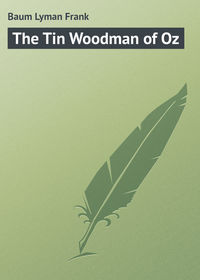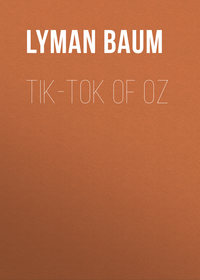 полная версия
полная версияThe Scarecrow of Oz

L. Frank Baum
The Scarecrow of Oz
’TWIXT YOU AND ME
The Army of Children which besieged the Postoffice, conquered the Postmen and delivered to me its imperious Commands, insisted that Trot and Cap’n Bill be admitted to the Land of Oz, where Trot could enjoy the society of Dorothy, Betsy Bobbin and Ozma, while the one-legged sailor-man might become a comrade of the Tin Woodman, the Shaggy Man, Tik-Tok and all the other quaint people who inhabit this wonderful fairyland.
It was no easy task to obey this order and land Trot and Cap’n Bill safely in Oz, as you will discover by reading this book. Indeed, it required the best efforts of our dear old friend, the Scarecrow, to save them from a dreadful fate on the journey; but the story leaves them happily located in Ozma’s splendid palace and Dorothy has promised me that Button-Bright and the three girls are sure to encounter, in the near future, some marvelous adventures in the Land of Oz, which I hope to be permitted to relate to you in the next Oz Book.
Meantime, I am deeply grateful to my little readers for their continued enthusiasm over the Oz stories, as evinced in the many letters they send me, all of which are lovingly cherished. It takes more and more Oz Books every year to satisfy the demands of old and new readers, and there have been formed many “Oz Reading Societies,” where the Oz Books owned by different members are read aloud. All this is very gratifying to me and encourages me to write more Oz stories. When the children have had enough of them, I hope they will let me know, and then I’ll try to write something different.
L. Frank Baum“Royal Historian of Oz.”“OZCOT”
at HOLLYWOOD in CALIFORNIA,
1915.
CHAPTER 1
The Great Whirlpool
“Seems to me,” said Cap’n Bill, as he sat beside Trot under the big acacia tree, looking out over the blue ocean, “seems to me, Trot, as how the more we know, the more we find we don’t know.”
“I can’t quite make that out, Cap’n Bill,” answered the little girl in a serious voice, after a moment’s thought, during which her eyes followed those of the old sailor-man across the glassy surface of the sea. “Seems to me that all we learn is jus’ so much gained.”
“I know; it looks that way at first sight,” said the sailor, nodding his head; "but those as knows the least have a habit of thinkin’ they know all there is to know, while them as knows the most admits what a turr’ble big world this is. It’s the knowing ones that realize one lifetime ain’t long enough to git more’n a few dips o’ the oars of knowledge."
Trot didn’t answer. She was a very little girl, with big, solemn eyes and an earnest, simple manner. Cap’n Bill had been her faithful companion for years and had taught her almost everything she knew.
He was a wonderful man, this Cap’n Bill. Not so very old, although his hair was grizzled – what there was of it. Most of his head was bald as an egg and as shiny as oilcloth, and this made his big ears stick out in a funny way. His eyes had a gentle look and were pale blue in color, and his round face was rugged and bronzed. Cap’n Bill’s left leg was missing, from the knee down, and that was why the sailor no longer sailed the seas. The wooden leg he wore was good enough to stump around with on land, or even to take Trot out for a row or a sail on the ocean, but when it came to “runnin’ up aloft” or performing active duties on shipboard, the old sailor was not equal to the task. The loss of his leg had ruined his career and the old sailor found comfort in devoting himself to the education and companionship of the little girl.
The accident to Cap’n Bill’s leg had happened at about the time Trot was born, and ever since that he had lived with Trot’s mother as “a star boarder,” having enough money saved up to pay for his weekly “keep.” He loved the baby and often held her on his lap; her first ride was on Cap’n Bill’s shoulders, for she had no baby-carriage; and when she began to toddle around, the child and the sailor became close comrades and enjoyed many strange adventures together. It is said the fairies had been present at Trot’s birth and had marked her forehead with their invisible mystic signs, so that she was able to see and do many wonderful things.
The acacia tree was on top of a high bluff, but a path ran down the bank in a zigzag way to the water’s edge, where Cap’n Bill’s boat was moored to a rock by means of a stout cable. It had been a hot, sultry afternoon, with scarcely a breath of air stirring, so Cap’n Bill and Trot had been quietly sitting beneath the shade of the tree, waiting for the sun to get low enough for them to take a row.
They had decided to visit one of the great caves which the waves had washed out of the rocky coast during many years of steady effort. The caves were a source of continual delight to both the girl and the sailor, who loved to explore their awesome depths.
“I b’lieve, Cap’n,” remarked Trot, at last, “that it’s time for us to start.”
The old man cast a shrewd glance at the sky, the sea and the motionless boat. Then he shook his head.
“Mebbe it’s time, Trot,” he answered, “but I don’t jes’ like the looks o’ things this afternoon.”
“What’s wrong?” she asked wonderingly.
“Can’t say as to that. Things is too quiet to suit me, that’s all. No breeze, not a ripple a-top the water, nary a gull a-flyin’ anywhere, an’ the end o’ the hottest day o’ the year. I ain’t no weather-prophet, Trot, but any sailor would know the signs is ominous.”
“There’s nothing wrong that I can see,” said Trot. “If there was a cloud in the sky even as big as my thumb, we might worry about it; but – look, Cap’n! – the sky is as clear as can be.”
He looked again and nodded.
“P’r’aps we can make the cave, all right,” he agreed, not wishing to disappoint her. “It’s only a little way out, an’ we’ll be on the watch; so come along, Trot.”
Together they descended the winding path to the beach. It was no trouble for the girl to keep her footing on the steep way, but Cap’n Bill, because of his wooden leg, had to hold on to rocks and roots now and then to save himself from tumbling. On a level path he was as spry as anyone, but to climb up hill or down required some care.
They reached the boat safely and while Trot was untying the rope Cap’n Bill reached into a crevice of the rock and drew out several tallow candles and a box of wax matches, which he thrust into the capacious pockets of his “sou’wester.” This sou’wester was a short coat of oilskin which the old sailor wore on all occasions – when he wore a coat at all – and the pockets always contained a variety of objects, useful and ornamental, which made even Trot wonder where they all came from and why Cap’n Bill should treasure them. The jackknives – a big one and a little one – the bits of cord, the fishhooks, the nails: these were handy to have on certain occasions. But bits of shell, and tin boxes with unknown contents, buttons, pincers, bottles of curious stones and the like, seemed quite unnecessary to carry around. That was Cap’n Bill’s business, however, and now that he added the candles and the matches to his collection Trot made no comment, for she knew these last were to light their way through the caves.
The sailor always rowed the boat, for he handled the oars with strength and skill. Trot sat in the stern and steered. The place where they embarked was a little bight or circular bay, and the boat cut across a much larger bay toward a distant headland where the caves were located, right at the water’s edge. They were nearly a mile from shore and about half-way across the bay when Trot suddenly sat up straight and exclaimed: “What’s that, Cap’n?”
He stopped rowing and turned half around to look.
“That, Trot,” he slowly replied, “looks to me mighty like a whirlpool.”
“What makes it, Cap’n?”
“A whirl in the air makes the whirl in the water. I was afraid as we’d meet with trouble, Trot. Things didn’t look right. The air was too still.”
“It’s coming closer,” said the girl.
The old man grabbed the oars and began rowing with all his strength.
“’Tain’t comin’ closer to us, Trot,” he gasped; “it’s we that are comin’ closer to the whirlpool. The thing is drawin’ us to it like a magnet!”
Trot’s sun-bronzed face was a little paler as she grasped the tiller firmly and tried to steer the boat away; but she said not a word to indicate fear.
The swirl of the water as they came nearer made a roaring sound that was fearful to listen to. So fierce and powerful was the whirlpool that it drew the surface of the sea into the form of a great basin, slanting downward toward the center, where a big hole had been made in the ocean – a hole with walls of water that were kept in place by the rapid whirling of the air.
The boat in which Trot and Cap’n Bill were riding was just on the outer edge of this saucer-like slant, and the old sailor knew very well that unless he could quickly force the little craft away from the rushing current they would soon be drawn into the great black hole that yawned in the middle. So he exerted all his might and pulled as he had never pulled before. He pulled so hard that the left oar snapped in two and sent Cap’n Bill sprawling upon the bottom of the boat.
He scrambled up quickly enough and glanced over the side. Then he looked at Trot, who sat quite still, with a serious, far-away look in her sweet eyes. The boat was now speeding swiftly of its own accord, following the line of the circular basin round and round and gradually drawing nearer to the great hole in the center. Any further effort to escape the whirlpool was useless, and realizing this fact Cap’n Bill turned toward Trot and put an arm around her, as if to shield her from the awful fate before them. He did not try to speak, because the roar of the waters would have drowned the sound of his voice.
These two faithful comrades had faced dangers before, but nothing to equal that which now faced them. Yet Cap’n Bill, noting the look in Trot’s eyes and remembering how often she had been protected by unseen powers, did not quite give way to despair.
The great hole in the dark water – now growing nearer and nearer – looked very terrifying; but they were both brave enough to face it and await the result of the adventure.
CHAPTER 2
The Cavern Under the Sea
The circles were so much smaller at the bottom of the basin, and the boat moved so much more swiftly, that Trot was beginning to get dizzy with the motion, when suddenly the boat made a leap and dived headlong into the murky depths of the hole. Whirling like tops, but still clinging together, the sailor and the girl were separated from their boat and plunged down – down – down – into the farthermost recesses of the great ocean.
At first their fall was swift as an arrow, but presently they seemed to be going more moderately and Trot was almost sure that unseen arms were about her, supporting her and protecting her. She could see nothing, because the water filled her eyes and blurred her vision, but she clung fast to Cap’n Bill’s sou’wester, while other arms clung fast to her, and so they gradually sank down and down until a full stop was made, when they began to ascend again.
But it seemed to Trot that they were not rising straight to the surface from where they had come. The water was no longer whirling them and they seemed to be drawn in a slanting direction through still, cool ocean depths. And then – in much quicker time than I have told it – up they popped to the surface and were cast at full length upon a sandy beach, where they lay choking and gasping for breath and wondering what had happened to them.
Trot was the first to recover. Disengaging herself from Cap’n Bill’s wet embrace and sitting up, she rubbed the water from her eyes and then looked around her. A soft, bluish-green glow lighted the place, which seemed to be a sort of cavern, for above and on either side of her were rugged rocks. They had been cast upon a beach of clear sand, which slanted upward from the pool of water at their feet – a pool which doubtless led into the big ocean that fed it. Above the reach of the waves of the pool were more rocks, and still more and more, into the dim windings and recesses of which the glowing light from the water did not penetrate.
The place looked grim and lonely, but Trot was thankful that she was still alive and had suffered no severe injury during her trying adventure under water. At her side Cap’n Bill was sputtering and coughing, trying to get rid of the water he had swallowed. Both of them were soaked through, yet the cavern was warm and comfortable and a wetting did not dismay the little girl in the least.
She crawled up the slant of sand and gathered in her hand a bunch of dried seaweed, with which she mopped the face of Cap’n Bill and cleared the water from his eyes and ears. Presently the old man sat up and stared at her intently. Then he nodded his bald head three times and said in a gurgling voice:
“Mighty good, Trot; mighty good! We didn’t reach Davy Jones’s locker that time, did we? Though why we didn’t, an’ why we’re here, is more’n I kin make out.”
“Take it easy, Cap’n,” she replied. “We’re safe enough, I guess, at least for the time being.”
He squeezed the water out of the bottoms of his loose trousers and felt of his wooden leg and arms and head, and finding he had brought all of his person with him he gathered courage to examine closely their surroundings.
“Where d’ye think we are, Trot?” he presently asked.
“Can’t say, Cap’n. P’r’aps in one of our caves.”
He shook his head. “No,” said he, “I don’t think that, at all. The distance we came up didn’t seem half as far as the distance we went down; an’ you’ll notice there ain’t any outside entrance to this cavern whatever. It’s a reg’lar dome over this pool o’ water, and unless there’s some passage at the back, up yonder, we’re fast pris’ners.”
Trot looked thoughtfully over her shoulder.
“When we’re rested,” she said, “we will crawl up there and see if there’s a way to get out.”
Cap’n Bill reached in the pocket of his oilskin coat and took out his pipe. It was still dry, for he kept it in an oilskin pouch with his tobacco. His matches were in a tight tin box, so in a few moments the old sailor was smoking contentedly. Trot knew it helped him to think when he was in any difficulty. Also, the pipe did much to restore the old sailor’s composure, after his long ducking and his terrible fright – a fright that was more on Trot’s account than his own.
The sand was dry where they sat, and soaked up the water that dripped from their clothing. When Trot had squeezed the wet out of her hair she began to feel much like her old self again. By and by they got upon their feet and crept up the incline to the scattered boulders above. Some of these were of huge size, but by passing between some and around others, they were able to reach the extreme rear of the cavern.
“Yes,” said Trot, with interest, “here’s a round hole.”
“And it’s black as night inside it,” remarked Cap’n Bill.
“Just the same,” answered the girl, “we ought to explore it, and see where it goes, ’cause it’s the only poss’ble way we can get out of this place.”
Cap’n Bill eyed the hole doubtfully.
“It may be a way out o’ here, Trot,” he said, “but it may be a way into a far worse place than this. I’m not sure but our best plan is to stay right here.”
Trot wasn’t sure, either, when she thought of it in that light. After awhile she made her way back to the sands again, and Cap’n Bill followed her. As they sat down, the child looked thoughtfully at the sailor’s bulging pockets.
“How much food have we got, Cap’n?” she asked.
“Half a dozen ship’s biscuits an’ a hunk o’ cheese,” he replied. “Want some now, Trot?”
She shook her head, saying:
“That ought to keep us alive ’bout three days if we’re careful of it.”
“Longer’n that, Trot,” said Cap’n Bill, but his voice was a little troubled and unsteady.
“But if we stay here we’re bound to starve in time,” continued the girl, “while if we go into the dark hole – ”
“Some things are more hard to face than starvation,” said the sailor-man, gravely. “We don’t know what’s inside that dark hole. Trot, nor where it might lead us to.”
“There’s a way to find that out,” she persisted.
Instead of replying, Cap’n Bill began searching in his pockets. He soon drew out a little package of fishhooks and a long line. Trot watched him join them together. Then he crept a little way up the slope and turned over a big rock. Two or three small crabs began scurrying away over the sands and the old sailor caught them and put one on his hook and the others in his pocket. Coming back to the pool he swung the hook over his shoulder and circled it around his head and cast it nearly into the center of the water, where he allowed it to sink gradually, paying out the line as far as it would go. When the end was reached, he began drawing it in again, until the crab bait was floating on the surface.
Trot watched him cast the line a second time, and a third. She decided that either there were no fishes in the pool or they would not bite the crab bait. But Cap’n Bill was an old fisherman and not easily discouraged. When the crab got away he put another on the hook. When the crabs were all gone he climbed up the rocks and found some more.
Meantime Trot tired of watching him and lay down upon the sands, where she fell fast asleep. During the next two hours her clothing dried completely, as did that of the old sailor. They were both so used to salt water that there was no danger of taking cold.
Finally the little girl was wakened by a splash beside her and a grunt of satisfaction from Cap’n Bill. She opened her eyes to find that the Cap’n had landed a silver-scaled fish weighing about two pounds. This cheered her considerably and she hurried to scrape together a heap of seaweed, while Cap’n Bill cut up the fish with his jackknife and got it ready for cooking.
They had cooked fish with seaweed before. Cap’n Bill wrapped his fish in some of the weed and dipped it in the water to dampen it. Then he lighted a match and set fire to Trot’s heap, which speedily burned down to a glowing bed of ashes. Then they laid the wrapped fish on the ashes, covered it with more seaweed, and allowed this to catch fire and burn to embers. After feeding the fire with seaweed for some time, the sailor finally decided that their supper was ready, so he scattered the ashes and drew out the bits of fish, still encased in their smoking wrappings. When these wrappings were removed, the fish was found thoroughly cooked and both Trot and Cap’n Bill ate of it freely. It had a slight flavor of seaweed and would have been better with a sprinkling of salt.
The soft glow which until now had lighted the cavern, began to grow dim, but there was a great quantity of seaweed in the place, so after they had eaten their fish they kept the fire alive for a time by giving it a handful of fuel now and then.
From an inner pocket the sailor drew a small flask of battered metal and unscrewing the cap handed it to Trot. She took but one swallow of the water, although she wanted more, and she noticed that Cap’n Bill merely wet his lips with it.
“S’pose,” said she, staring at the glowing seaweed fire and speaking slowly, “that we can catch all the fish we need; how ’bout the drinking-water, Cap’n?”
He moved uneasily but did not reply. Both of them were thinking about the dark hole, but while Trot had little fear of it the old man could not overcome his dislike to enter the place. He knew that Trot was right, though. To remain in the cavern, where they now were, could only result in slow but sure death.
It was nighttime upon the earth’s surface, so the little girl became drowsy and soon fell asleep. After a time the old sailor slumbered on the sands beside her. It was very still and nothing disturbed them for hours. When at last they awoke the cavern was light again.
They had divided one of the biscuits and were munching it for breakfast when they were startled by a sudden splash in the pool. Looking toward it they saw emerging from the water the most curious creature either of them had ever beheld. It wasn’t a fish, Trot decided, nor was it a beast. It had wings, though, and queer wings they were: shaped like an inverted chopping-bowl and covered with tough skin instead of feathers. It had four legs – much like the legs of a stork, only double the number – and its head was shaped a good deal like that of a poll parrot, with a beak that curved downward in front and upward at the edges, and was half bill and half mouth. But to call it a bird was out of the question, because it had 110 feathers whatever except a crest of wavy plumes of a scarlet color on the very top of its head. The strange creature must have weighed as much as Cap’n Bill, and as it floundered and struggled to get out of the water to the sandy beach it was so big and unusual that both Trot and her companion stared at it in wonder – in wonder that was not unmixed with fear.
CHAPTER 3
The Ork
The eyes that regarded them, as the creature stood dripping before them, were bright and mild in expression, and the queer addition to their party made no attempt to attack them and seemed quite as surprised by the meeting as they were.
“I wonder,” whispered Trot, “what it is.”
“Who, me?” exclaimed the creature in a shrill, high-pitched voice. “Why, I’m an Ork.”
“Oh!” said the girl. “But what is an Ork?”
“I am,” he repeated, a little proudly, as he shook the water from his funny wings; "and if ever an Ork was glad to be out of the water and on dry land again, you can be mighty sure that I’m that especial, individual Ork!"
“Have you been in the water long?” inquired Cap’n Bill, thinking it only polite to show an interest in the strange creature.
“Why, this last ducking was about ten minutes, I believe, and that’s about nine minutes and sixty seconds too long for comfort,” was the reply. “But last night I was in an awful pickle, I assure you. The whirlpool caught me, and – ”
“Oh, were you in the whirlpool, too?” asked Trot eagerly.
He gave her a glance that was somewhat reproachful.
“I believe I was mentioning the fact, young lady, when your desire to talk interrupted me,” said the Ork. “I am not usually careless in my actions, but that whirlpool was so busy yesterday that I thought I’d see what mischief it was up to. So I flew a little too near it and the suction of the air drew me down into the depths of the ocean. Water and I are natural enemies, and it would have conquered me this time had not a bevy of pretty mermaids come to my assistance and dragged me away from the whirling water and far up into a cavern, where they deserted me.”
“Why, that’s about the same thing that happened to us,” cried Trot. “Was your cavern like this one?”
“I haven’t examined this one yet,” answered the Ork; “but if they happen to be alike I shudder at our fate, for the other one was a prison, with no outlet except by means of the water. I stayed there all night, however, and this morning I plunged into the pool, as far down as I could go, and then swam as hard and as far as I could. The rocks scraped my back, now and then, and I barely escaped the clutches of an ugly sea-monster; but by and by I came to the surface to catch my breath, and found myself here. That’s the whole story, and as I see you have something to eat I entreat you to give me a share of it. The truth is, I’m half starved.”
With these words the Ork squatted down beside them. Very reluctantly Cap’n Bill drew another biscuit from his pocket and held it out. The Ork promptly seized it in one of its front claws and began to nibble the biscuit in much the same manner a parrot might have done.
“We haven’t much grub,” said the sailor-man, “but we’re willin’ to share it with a comrade in distress.”
“That’s right,” returned the Ork, cocking its head sidewise in a cheerful manner, and then for a few minutes there was silence while they all ate of the biscuits. After a while Trot said:
“I’ve never seen or heard of an Ork before. Are there many of you?”
“We are rather few and exclusive, I believe,” was the reply. “In the country where I was born we are the absolute rulers of all living things, from ants to elephants.”









